(完整)动词第三人称单数变化规则如下
动词第三人称单数变化规则如下
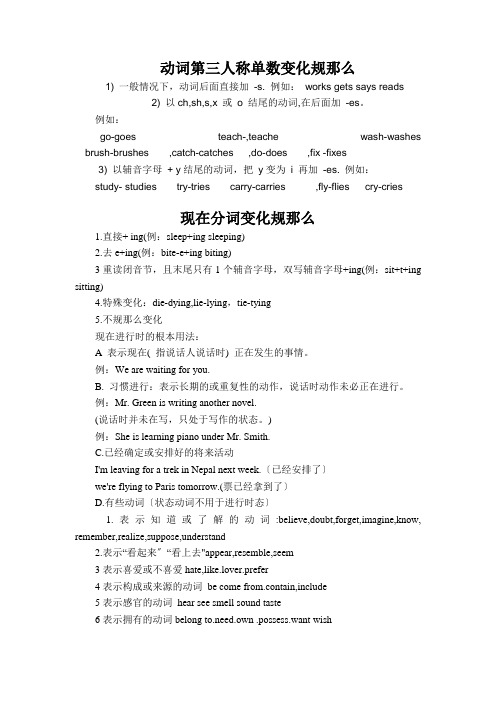
动词第三人称单数变化规那么1) 一般情况下,动词后面直接加-s. 例如:works gets says reads2) 以ch,sh,s,x 或o 结尾的动词,在后面加-es。
例如:go-goes teach-,teache wash-washes brush-brushes ,catch-catches ,do-does ,fix -fixes3) 以辅音字母+ y结尾的动词,把y变为i 再加-es. 例如:study- studies try-tries carry-carries ,fly-flies cry-cries现在分词变化规那么1.直接+ ing(例:sleep+ing sleeping)2.去e+ing(例:bite-e+ing biting)3重读闭音节,且末尾只有1个辅音字母,双写辅音字母+ing(例:sit+t+ing sitting)4.特殊变化:die-dying,lie-lying,tie-tying5.不规那么变化现在进行时的根本用法:A 表示现在( 指说话人说话时) 正在发生的事情。
例:We are waiting for you.B. 习惯进行:表示长期的或重复性的动作,说话时动作未必正在进行。
例:Mr. Green is writing another novel.(说话时并未在写,只处于写作的状态。
)例:She is learning piano under Mr. Smith.C.已经确定或安排好的将来活动I'm leaving for a trek in Nepal next week.〔已经安排了〕we're flying to Paris tomorrow.(票已经拿到了〕D.有些动词〔状态动词不用于进行时态〕1.表示知道或了解的动词:believe,doubt,forget,imagine,know, remember,realize,suppose,understand2.表示“看起来〞“看上去"appear,resemble,seem3表示喜爱或不喜爱hate,like.lover.prefer4表示构成或来源的动词be come from.contain,include5表示感官的动词hear see smell sound taste6表示拥有的动词belong to.need.own .possess.want wish1、现在进行时的构成现在进行时由"be+v-ing"构成。
(完整版)动词变第三人称单数规则
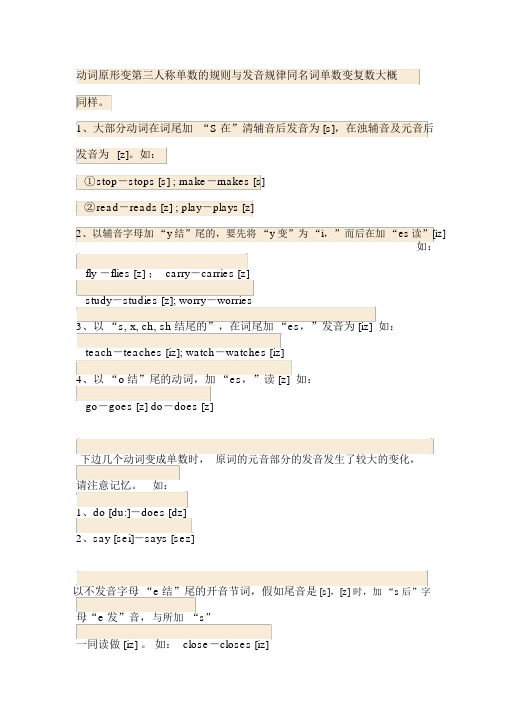
动词原形变第三人称单数的规则与发音规律同名词单数变复数大概同样。
1、大部分动词在词尾加“S在”清辅音后发音为 [s],在浊辅音及元音后发音为[z]。
如:①s top-stops [s] ; make-makes [s]②r ead-reads [z] ; play-plays [z]2、以辅音字母加“y结”尾的,要先将“y变”为“i,”而后在加“es读”[iz]如:fly -flies [z] ; carry-carries [z]study-studies [z]; worry-worries3、以“s, x, ch, sh结尾的”,在词尾加“es,”发音为 [iz] 如:teach-teaches [iz]; watch-watches [iz]4、以“o结”尾的动词,加“es,”读 [z] 如:go-goes [z] do-does [z]下边几个动词变成单数时,原词的元音部分的发音发生了较大的变化,请注意记忆。
如:1、do [du:]-does [dz]2、say [sei]-says [sez]以不发音字母“e结”尾的开音节词,假如尾音是[s],[z] 时,加“s后”字母“e发”音,与所加“s”一同读做 [iz] 。
如: close-closes [iz]be 动词包含: am, is, are。
第三人称单数用is;过去式为was;复数用 are,过去式为 were.除上述规律外,还应注意下边三点:1.动词 have ,碰到主语是第三人称单数时,要用 has;动词 be 的第三人称单数形式是is。
2.含有动词第三人称单数形式的句子变否认句时,要用 doesn't + 动词原形,如:He goes to school at six in the morning. 变(否认句 ) → He doesn't go to school at six in the morning.3.对含有动词第三人称单数形式的句子发问时,要用助动词does,如:She goes home at five every day.对(划线部分发问 ) → When / What time does she go home every day?一般此刻时中的第三人称单数形式在一般此刻时中,当主语是第三人称单数时,谓语动词要用第三人称单数形式,即常在动词原形后加-s 或-es。
(完整版)动词各种词性变化规则
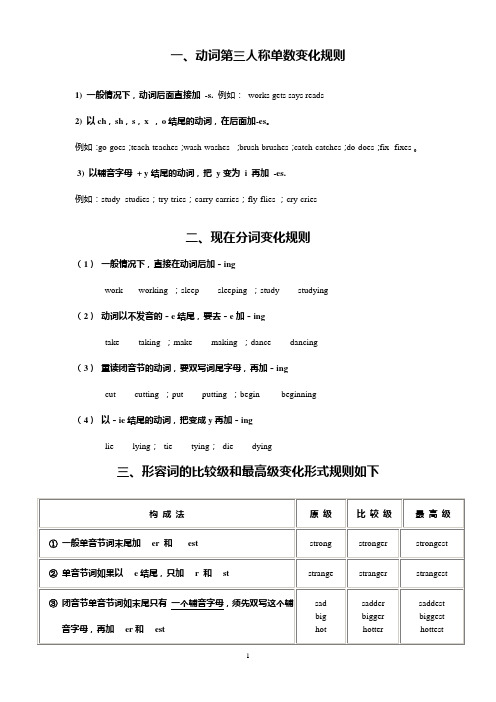
一、动词第三人称单数变化规则1) 一般情况下,动词后面直接加-s. 例如:works gets says reads2) 以ch,sh,s,x ,o结尾的动词,在后面加-es。
例如:go-goes;teach-teaches;wash-washes ;brush-brushes;catch-catches;do-does;fix -fixes 。
3) 以辅音字母+ y结尾的动词,把y变为i 再加-es.例如:study- studies;try-tries;carry-carries;fly-flies ;cry-cries二、现在分词变化规则(1)一般情况下,直接在动词后加-ingwork ---- working ;sleep ----- sleeping ;study ----- studying(2)动词以不发音的-e结尾,要去-e加-ingtake ----- taking ;make ----- making ;dance ----- dancing(3)重读闭音节的动词,要双写词尾字母,再加-ingcut ----- cutting ;put ----- putting ;begin ------ beginning(4)以-ie结尾的动词,把变成y再加-inglie ----- lying;tie ----- tying;die ----- dying三、形容词的比较级和最高级变化形式规则如下①一般单音节词末尾加er 和est②单音节词如果以e结尾,只加r 和st③闭音节单音节词如末尾只有一个辅音字母,须先双写这个辅音字母,再加er和est④少数以y,er(或ure),ow,ble结尾的双音节词,末尾加er和est(以y结尾的词,如y前是辅音字母,把y变成i,再加er和est,以e结尾的词仍加r和st)。
3. 也有少数单音节词可以加more和most的办法构成比较级和最高级:原级比较级最高级pleased more pleased most pleasedtired more tired most tiredglad more glad most glad四、名词的复数形式名词复数的不规则变化1)child---children;foot---feet ;tooth---teeth ;mouse---mice;man---men woman---women注意:与man 和woman构成的合成词,其复数形式也是-men 和-women。
动词变成第三人称单数变化规则
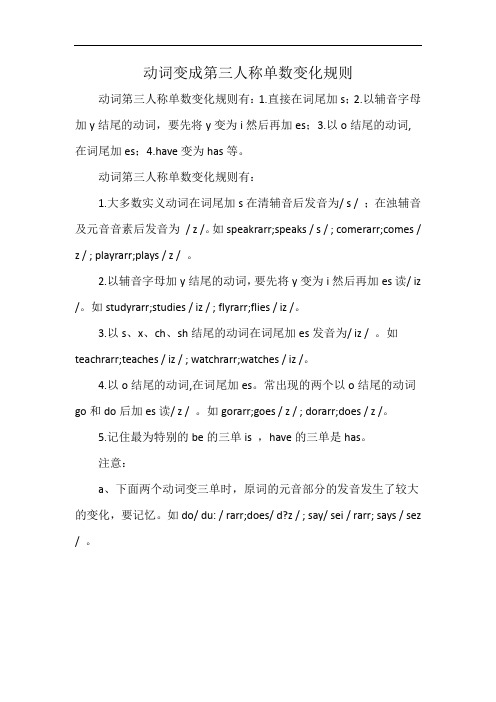
动词变成第三人称单数变化规则
动词第三人称单数变化规则有:1.直接在词尾加s;2.以辅音字母加y结尾的动词,要先将y变为i然后再加es;3.以o结尾的动词,在词尾加es;4.have变为has等。
动词第三人称单数变化规则有:
1.大多数实义动词在词尾加s在清辅音后发音为/ s / ;在浊辅音及元音音素后发音为/ z /。
如speakrarr;speaks / s / ; comerarr;comes / z / ; playrarr;plays / z / 。
2.以辅音字母加y结尾的动词,要先将y变为i然后再加es读/ iz /。
如studyrarr;studies / iz / ; flyrarr;flies / iz /。
3.以s、x、ch、sh结尾的动词在词尾加es发音为/ iz / 。
如teachrarr;teaches / iz / ; watchrarr;watches / iz /。
4.以o结尾的动词,在词尾加es。
常出现的两个以o结尾的动词go和do后加es读/ z / 。
如gorarr;goes / z / ; dorarr;does / z /。
5.记住最为特别的be的三单is ,have的三单是has。
注意:
a、下面两个动词变三单时,原词的元音部分的发音发生了较大的变化,要记忆。
如do/ du: / rarr;does/ d?z / ; say/ sei / rarr; says / sez / 。
动词《第三人称单数形式》的变化规则
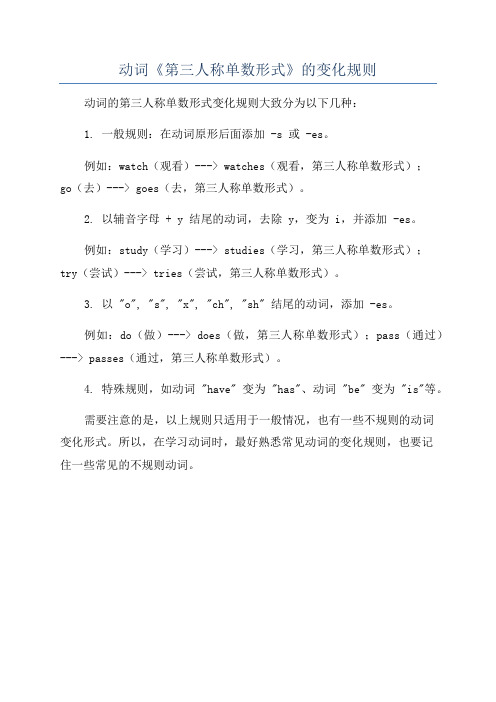
动词《第三人称单数形式》的变化规则动词的第三人称单数形式变化规则大致分为以下几种:
1. 一般规则:在动词原形后面添加 -s 或 -es。
例如:watch(观看)---> watches(观看,第三人称单数形式);
go(去)---> goes(去,第三人称单数形式)。
2. 以辅音字母 + y 结尾的动词,去除 y,变为 i,并添加 -es。
例如:study(学习)---> studies(学习,第三人称单数形式);
try(尝试)---> tries(尝试,第三人称单数形式)。
3. 以 "o", "s", "x", "ch", "sh" 结尾的动词,添加 -es。
例如:do(做)---> does(做,第三人称单数形式);pass(通过)---> passes(通过,第三人称单数形式)。
4. 特殊规则,如动词 "have" 变为 "has"、动词 "be" 变为 "is"等。
需要注意的是,以上规则只适用于一般情况,也有一些不规则的动词
变化形式。
所以,在学习动词时,最好熟悉常见动词的变化规则,也要记
住一些常见的不规则动词。
动词三单的变化规则

动词三单的变化规则
动词的三单形式是指在第三人称单数主语(he、she、it)下的动词变化。
一般情况下,在动词三单形式中,动词要加-s、-es或-ies。
具体的变化规则如下:
1. 一般规则:大多数动词在第三人称单数时,直接在动词原形后添加-s。
例如:play → plays,talk → talks,run → runs。
2. 以-s、-ss、-sh、-ch、-x、-o结尾的动词:在这些动词的第三人称单数形式中,要在动词原形后添加-es。
例如:pass → passes,brush → brushes,wash → washes,watch → watches。
3. 以辅音字母+y结尾的动词:如果辅音字母y前面是元音字母,则直接在动词原形后添加-s。
例如:play → plays。
如果辅音字母y前面是辅音字母,则将y改为i,再加-es。
例如:carry → carries,study → studies。
4. 不规则变化的动词:有一些动词的第三人称单数形式变化不遵循以上规则,需要记忆这些不规则变化。
例如:be → is,have → has,do → does,go → goes。
需要注意的是,动词的三单形式还会受到时态、语气和语法结构等因素的影响,有时会发生变化。
因此,需要根据具体的语境来确定动词的变化形式。
(完整版)动词第三人称单数的变化规则及练习.docx

动词第三人称单数的变化规则及练习一、变化规则1、直接在动词后 +s例如:like- likes play-plays2、以 s, x, sh, ch, 接尾的动词: +es例如:wash-washes3、以辅音 +o 接尾的动词: +es例如:go-goes4、以辅音 +y 接尾的动词:变y 为 i+es例如:fly-flies动词短语:+s:Plays, skips, sings, gives, starts, likes,buys some toys, gets up comes back homemakes noodles, eats lunch drinks coffeebegins his class , practises the piano+es :watches TV brushes his teethgoes to bed goes to schooldoes my homework does some readingy→ i+ es: fly→ flies study→ studies注意:不规则变化: have-----has,be-------is,do-----does写出下列动词的第三人称单数drink ________ go _______ stay ________ make ________look _________ have_______ pass_______ carry ____come________ watch______ plant_______ fly ________study_______ brush________ do_________ teach_______二、请看下面两组句子,注意区分他们的共同点和不同点。
I go to school every day.I don't go to school every day.He goes to school every day.He doesn't go to school every day.Do you go to school every day?Yes, I do. (No, I don't)Does he go to school every day?Yes, he does. (No, he doesn't)注:1)第三人称单数用了does 后面就不用动词的s 形式了 ,而用动词原形 .。
动词第三人称单数的变化规则

动词第三人称单数的变化规则
1. 大多数动词直接在原形后加上 "-s",例如:play(玩)→ plays (他/她/它玩); walk(走)→ walks(他/她/它走)。
2. 以辅音字母+y结尾的动词,将 "y" 变为 "i",再加上 "-es"。
例如:study(学习)→ studies(他/她/它学习); fly(飞)→ flies (他/她/它飞)。
3. 以s, x, ch, sh, o结尾的动词,加上 "-es"。
例如:pass(通过)→ passes(他/她/它通过); fix(修理)→ fixes(他/她/它修理); watch(观看)→ watches(他/她/它观看); wash(洗)→ washes(他/她/它洗); go(去)→ goes(他/她/它去)。
4. 一些动词的变化形式不遵循常规规则,而是有特殊变化形式。
例如:have(有)→ has(他/她/它有); do(做)→ does(他/她/它做); go(去)→ goes(他/她/它去)。
需要注意的是,这只适用于一般现在时的第三人称单数形式,而在其他时态或形式中,动词的变化规则可能会有所不同。
动词第三人称单数变化规则

在一般现在时中,当主语是第三人称单数时,谓语动词要用第三人称单数形式,即常在动词原形后加-s或-es。
现归纳总结如下:一、人称代词he, she, it是第三人称单数。
二、单个人名、地名或称呼作主语;是第三人称单数。
三、单数可数名词或"this / that / the+单数可数名词"作主语时,是第三人称单数。
四、不可数名词作主语时为第三人称单数。
五、当数字或字母作主语时,看作第三人称单数。
除上述规律外,还应注意下面三点:1. 动词 have ,遇到主语是第三人称单数时,要用 has;动词 be 的第三人称单数形式是is。
2. 含有动词第三人称单数形式的句子变否定句时,要用 doesn't + 动词原形,如:He goes to school at six in the morning. (变否定句)→ He doesn't go to school at six in the morning.3. 对含有动词第三人称单数形式的句子提问时,要用助动词 does,如:She goes home at five every day.(对划线部分提问)→ When / What time does she go home every day?动词第三人称单数的变化规则1、大多数动词在词尾加“S”2、以辅音字母加“y”结尾的,要先将“y”变为“i”,然后再加“es”3、以“o, s, x, ch, sh”结尾的,在词尾加“es”4、不规则变化:have变为hasgo- do-stop- make-read- play-fly- carry-study- worry-teach- watch-1.You are my mother.(用She改写)2.The children go to the park.(用They 改写)3.The two boys sit on the bench.(用He改写)1.我通常坐公交车去上学。
动词单三变化规则口诀
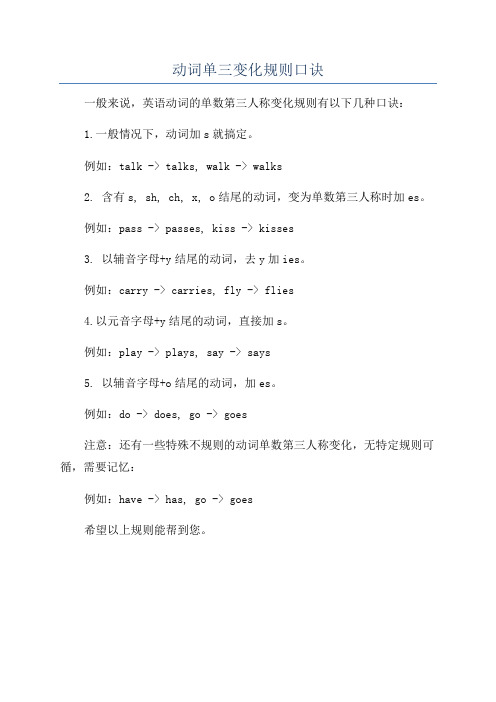
动词单三变化规则口诀
一般来说,英语动词的单数第三人称变化规则有以下几种口诀:
1.一般情况下,动词加s就搞定。
例如:talk -> talks, walk -> walks
2. 含有s, sh, ch, x, o结尾的动词,变为单数第三人称时加es。
例如:pass -> passes, kiss -> kisses
3. 以辅音字母+y结尾的动词,去y加ies。
例如:carry -> carries, fly -> flies
4.以元音字母+y结尾的动词,直接加s。
例如:play -> plays, say -> says
5. 以辅音字母+o结尾的动词,加es。
例如:do -> does, go -> goes
注意:还有一些特殊不规则的动词单数第三人称变化,无特定规则可循,需要记忆:
例如:have -> has, go -> goes
希望以上规则能帮到您。
动词单三变化规则

动词单三变化规则
一般情况下,英语动词变为单数第三人称形式的规则如下:
1. 对于大多数动词,只需在动词词尾加上字母"s"。
例如:play → plays, speak → speaks。
2. 若动词以字母s, x, z, ch, sh结尾,则需在词尾加上字母"es"。
例如:pass → passes, watch → watches。
3. 若动词以“辅音字母+y”结尾,则将"y"改为"i",再加上"es"。
例如:study → studies, fly → flies。
4. 若动词以“o”结尾,则需在词尾加上字母"es"。
但存在一些特例,如do → does, go → goes。
5. 一些不规则动词的单数第三人称形式需要特别记忆,例如:have
→ has, do → does, be → is/are。
需要注意的是,以上规则并不适用于所有动词,有些动词在单数第三
人称形式时会发生其他变化,所以在学习时还需要特别注意不规则动词的
变化形式。
动词第三人称单数读音变化规则
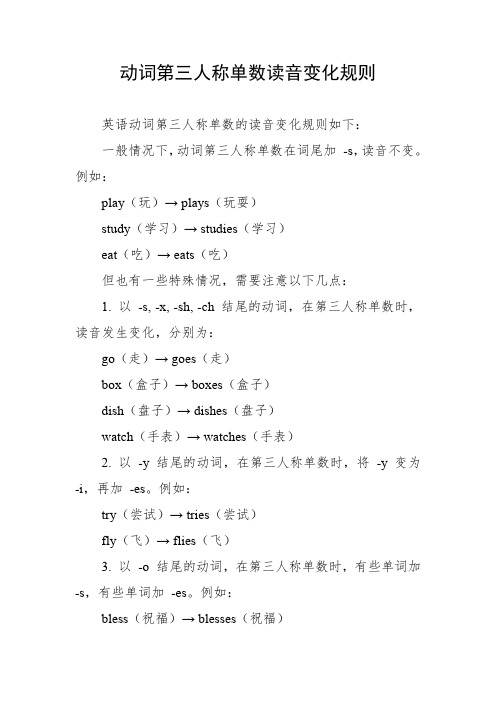
动词第三人称单数读音变化规则
英语动词第三人称单数的读音变化规则如下:
一般情况下,动词第三人称单数在词尾加-s,读音不变。
例如:
play(玩)→ plays(玩耍)
study(学习)→ studies(学习)
eat(吃)→ eats(吃)
但也有一些特殊情况,需要注意以下几点:
1. 以-s, -x, -sh, -ch 结尾的动词,在第三人称单数时,读音发生变化,分别为:
go(走)→ goes(走)
box(盒子)→ boxes(盒子)
dish(盘子)→ dishes(盘子)
watch(手表)→ watches(手表)
2. 以-y 结尾的动词,在第三人称单数时,将-y 变为-i,再加-es。
例如:
try(尝试)→ tries(尝试)
fly(飞)→ flies(飞)
3. 以-o 结尾的动词,在第三人称单数时,有些单词加-s,有些单词加-es。
例如:
bless(祝福)→ blesses(祝福)
clown(小丑)→ clowns(小丑)
hero(英雄)→ heroes(英雄)
需要注意的是,这些规则并不是绝对的,也有一些特殊的动词变化,需要根据具体情况进行学习和记忆。
动词三单的变化规律
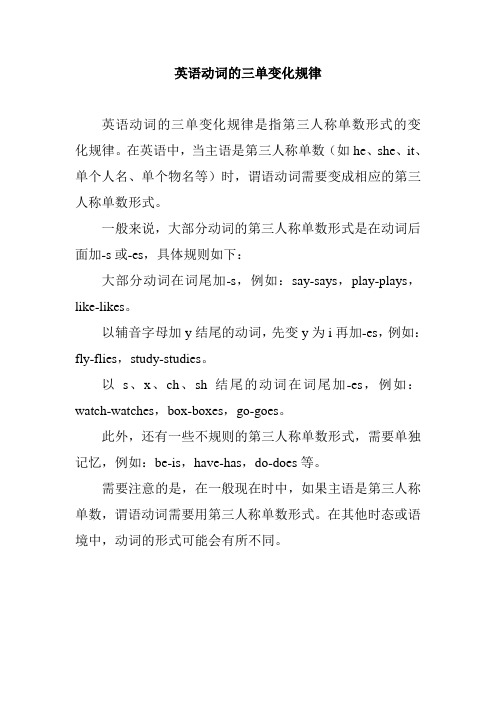
英语动词的三单变化规律
英语动词的三单变化规律是指第三人称单数形式的变化规律。
在英语中,当主语是第三人称单数(如he、she、it、单个人名、单个物名等)时,谓语动词需要变成相应的第三人称单数形式。
一般来说,大部分动词的第三人称单数形式是在动词后面加-s或-es,具体规则如下:
大部分动词在词尾加-s,例如:say-says,play-plays,like-likes。
以辅音字母加y结尾的动词,先变y为i再加-es,例如:fly-flies,study-studies。
以s、x、ch、sh结尾的动词在词尾加-es,例如:watch-watches,box-boxes,go-goes。
此外,还有一些不规则的第三人称单数形式,需要单独记忆,例如:be-is,have-has,do-does等。
需要注意的是,在一般现在时中,如果主语是第三人称单数,谓语动词需要用第三人称单数形式。
在其他时态或语境中,动词的形式可能会有所不同。
动词第三人称单数变化规则如下
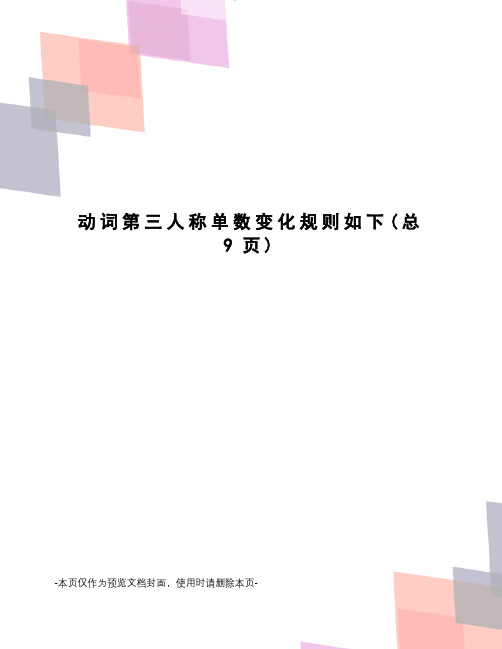
动词第三人称单数变化规则如下(总9页)-本页仅作为预览文档封面,使用时请删除本页-动词第三人称单数变化规则1) 一般情况下,动词后面直接加 -s. 例如: works gets says reads2) 以ch,sh,s,x 或 o 结尾的动词,在后面加 -es。
例如:go-goes teach-,teache wash-washes brush-brushes ,catch-catches ,do-does ,fix -fixes 3) 以辅音字母 + y结尾的动词,把 y变为 i 再加 -es. 例如:study- studies try-tries carry-carries ,fly-flies cry-cries现在分词变化规则1.直接+ ing(例:sleep+ing sleeping)2.去e+ing(例:bite-e+ing biting)3重读闭音节,且末尾只有1个辅音字母,双写辅音字母+ing(例:sit+t+ing sitting)4.特殊变化:die-dying,lie-lying,tie-tying5.不规则变化现在进行时的基本用法:A 表示现在( 指说话人说话时) 正在发生的事情。
例:We are waiting for you.B. 习惯进行:表示长期的或重复性的动作,说话时动作未必正在进行。
例:Mr. Green is writing another novel.(说话时并未在写,只处于写作的状态。
)例:She is learning piano under Mr. Smith.C.已经确定或安排好的将来活动I'm leaving for a trek in Nepal next week.(已经安排了)we're flying to Paris tomorrow.(票已经拿到了)D.有些动词(状态动词不用于进行时态)1.表示知道或了解的动词:believe,doubt,forget,imagine,know, remember,realize,suppose,understand2.表示“看起来”“看上去"appear,resemble,seem3表示喜爱或不喜爱hate,4表示构成或来源的动词 be come ,include5表示感官的动词 hear see smell sound taste6表示拥有的动词belong . wish1、现在进行时的构成现在进行时由"be+v-ing"构成。
英语动词第三人称单数变化规则

英语动词第三人称单数变化规则
一般情况下,英语动词在第三人称单数时,会在原来的词尾加上-s
或-es。
1. 词尾是不发音的辅音字母结尾的动词,在第三人称单数时加-s。
例如:like(喜欢)→ likes(喜欢), watch(观看)→ watches(观看)。
2. 词尾是发音的辅音字母结尾的动词,在第三人称单数时加-es。
例如:fix(修理)→ fixes(修理), match(匹配)→ matches(匹配)。
3. 以字母-y结尾,而在y之前是辅音字母的动词,在第三人称单数
时将-y变为-i,再加-es。
例如:study(学习)→ studies(学习),
try(尝试)→ tries(尝试)。
4. 以字母-y结尾,而在y之前是元音字母的动词,直接加-s。
例如:play(玩)→ plays(玩), stay(停留)→ stays(停留)。
5. 以字母-o结尾的动词,一般在第三人称单数时加-es。
例如:go (去)→ goes(去), do(做)→ does(做)。
- 1、下载文档前请自行甄别文档内容的完整性,平台不提供额外的编辑、内容补充、找答案等附加服务。
- 2、"仅部分预览"的文档,不可在线预览部分如存在完整性等问题,可反馈申请退款(可完整预览的文档不适用该条件!)。
- 3、如文档侵犯您的权益,请联系客服反馈,我们会尽快为您处理(人工客服工作时间:9:00-18:30)。
动词第三人称单数变化规则1) 一般情况下,动词后面直接加-s. 例如: works gets says reads2)以ch,sh,s,x 或 o 结尾的动词,在后面加 -es.例如:go—goes teach—,teache wash—washes brush—brushes ,catch—catches ,do-does ,fix -fixes3) 以辅音字母 + y结尾的动词,把 y变为 i 再加—es。
例如:study- studies try—tries carry-carries ,fly—flies cry—cries现在分词变化规则1.直接+ ing(例:sleep+ing sleeping)2.去e+ing(例:bite-e+ing biting)3重读闭音节,且末尾只有1个辅音字母,双写辅音字母+ing(例:sit+t+ing sitting)4.特殊变化:die-dying,lie—lying,tie—tying5。
不规则变化现在进行时的基本用法:A 表示现在( 指说话人说话时)正在发生的事情。
例:We are waiting for you。
B. 习惯进行:表示长期的或重复性的动作,说话时动作未必正在进行.例:Mr。
Green is writing another novel。
(说话时并未在写,只处于写作的状态。
)例:She is learning piano under Mr。
Smith。
C.已经确定或安排好的将来活动I'm leaving for a trek in Nepal next week.(已经安排了)we’re flying to Paris tomorrow。
(票已经拿到了)D.有些动词(状态动词不用于进行时态)1。
表示知道或了解的动词:believe,doubt,forget,imagine,know, remember,realize,suppose,understand2.表示“看起来”“看上去”appear,resemble,seem3表示喜爱或不喜爱hate,like。
lover。
prefer4表示构成或来源的动词 be come from.contain,include5表示感官的动词 hear see smell sound taste6表示拥有的动词belong to.need.own 。
possess.want wish1、现在进行时的构成现在进行时由"be+v—ing"构成。
be应为助动词,最容易被同学漏掉,它应与主语的人称和数保持一致。
2、现在进行时的应用(1)当句子中有now时,常表示动作正在进行,这时要用现在进行时。
如:They are playing basketball now.现在他们正在打篮球。
(2)以look, listen开头的句子,提示我们动作正进行,这时要用现在进行时。
如:Listen!She is singing an English song。
听,她正在唱英语歌。
(3)表示当前一段时间或现阶段正在进行的动作,且此时有this week, these days等时间词,这时常用现在进行时.如:We are making model planes these days。
这些天我们在做飞机模型.(4)描述图片中的人物的动作,也为了表达更生动。
此时也常用现在进行时.如:Look at the picture. The children are flying kites in the park。
看这幅图,那些孩子正在公园放风筝。
3、现在分词的变化规则:(1) 一般情况下,直接在动词后加-ingwork —-—- workingsleep -———- sleepingstudy ---—— studying(2) 动词以不发音的-e结尾,要去-e加-ingtake ——--- takingmake ——-—— makingdance —---— dancing(3)重读闭音节的动词,要双写词尾字母,再加-ingcut -———— cuttingput ——-—- puttingbegin —---—— beginning(4) 以-ie结尾的动词,把变成y再加-inglie ——--- lyingtie ---—- tyingdie --——- dying4、现在进行时的变化肯定句式:主语+be( am, is, are)+现在分词+其它。
否定句式:主语+be(am, is, are) +not +现在分词+其它。
一般疑问句:be(am, is, are) +主语+现在分词+其它特殊疑问句:疑问词+be(am, is, are)+主语+现在分词+其它① 一般单音节词末尾加er 和est② 单音节词如果以e结尾,只加r 和st③ 闭音节单音节词如末尾只有一个辅音字母,须先双写这个辅音字母,再加er和est④ 少数以y,er(或ure),ow,ble结尾的双音节词,末尾加er和est(以y结尾的词,如y前是辅音字母,把y变成i,再加er和est,以e结尾的词仍加r和st)Exercises:I。
学会下列形容词的比较级和最高级:原级比较级最高级1. tall taller talleststrong stronger strongestold older oldest2。
large larger largestfine finer finestlate later latest3. big bigger biggesthot hotter hottestthin thinner thinnest4. easy easier easiestbusy busier busiesthappy happier happiest5. valuable more valuable most valuabledangerous more dangerous most dangerouscomfortable more comfortable most comfortable1. 有几个形容词有特殊的比较级和最高级形式:原级比较级最高级good well better bestbad ill worse worstmany much more mostlittle less leastfar farther further farthest furthestold older elder oldest eldest小贴士1:elder和eldest可用来表示兄弟和子女的长幼顺序:my elder sister 我的姐姐my eldest brother 我的大哥their eldest son他们的长子小贴士1:further表示“较远"外,还可表示“进一步的”;而farther仅表示距离:The farther plants are too cold。
更远的行星太冷。
Do you need any further help? 你还需要更进一步的帮助吗?2。
双音节词除了以“辅音+y”结尾的词外,还有以ow, er, le结尾的词,和个别其他双音节词,可以用加词尾的办法构成比较级和最高级:原级比较级最高级narrow narrower narrowestclever cleverer cleverestsimple simpler simplestcommon commoner commonest3. 也有少数单音节词可以加more和most的办法构成比较级和最高级:原级比较级最高级pleased more pleased most pleasedtired more tired most tiredglad more glad most glad名词的复数形式其它名词复数的规则变化1)以y结尾的专有名词,或元音字母+y 结尾的名词变复数时,直接加s变复数:如: two Marys the Henrysmonkey—-—monkeys holiday———holidays比较:层楼:storey ——-storeys story—--stories2) 以o 结尾的名词,变复数时:a。
加s,如: photo——-photos piano———pianosradio—-—radios zoo—--zoos;b. 加es,如:potato-—potatoes tomato——tomatoesc. 均可,如:zero—--zeros / zeroes3) 以f或fe 结尾的名词变复数时:a。
加s,如: belief---beliefs roof--—roofssafe-—-safes gulf——-gulfs;b。
去f,fe 加ves,如:half---halvesknife---knives leaf---leaves wolf--—wolveswife--—wives life———lives thief--—thieves;c。
均可,如: handkerchief:handkerchiefs / handkerchieves名词复数的不规则变化1)child--—children foot-—-feet tooth——-teethmouse—-—mice man---men woman—-—women注意:与 man 和 woman构成的合成词,其复数形式也是—men 和—women。
如: an Englishman,two Englishmen。
但German不是合成词,故复数形式为Germans;Bowman 是姓,其复数是the Bowmans。
2)单复同形如:deer,sheep,fish,Chinese,Japaneseli,jin,yuan,two li,three mu,four jin但除人民币元、角、分外,美元、英镑、法郎等都有复数形式。
如:a dollar, two dollars; a meter, two meters3)集体名词,以单数形式出现,但实为复数。
如 people police cattle 等本身就是复数,不能说 a people,a police,a cattle,但可以说a person,a policeman,a head of cattle,the English,the British,the French,the Chinese,the Japanese,the Swiss 等名词,表示国民总称时,作复数用。
如: The Chinese are industries and brave. 中国人民是勤劳勇敢的。
